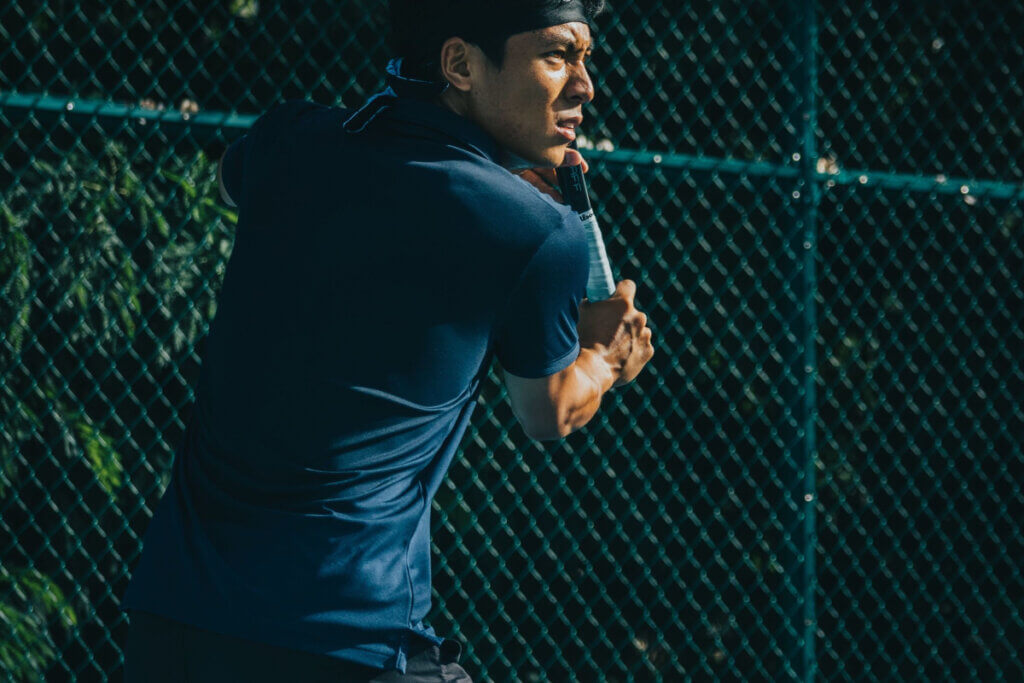Play With Courage
posted on: February 9, 2022
author: Brian Lomax, Ed.D.

“Courage is not the absence of fear, but rather the assessment that something else is more important than fear.”
-Franklin D. Roosevelt, 32nd President of the United States
Courage. In Stoic philosophy, it is one of the four cardinal virtues (wisdom, temperance, and justice are the others). It’s that important. Striving for your potential depends on practicing courage. Living a meaningful and fulfilling life depends on it too. And as a competitor, you are frequently face-to-face with fear. In those moments, it’s okay to be scared, but it’s not okay to let that stop you (Holiday, 2021). That’s what Franklin D. Roosevelt was talking about when he stated that there is something else more important than fear. Your performance and potential are on the line. Do you want fear to be the reason you didn’t perform your best or why you didn’t live a full life?
What Do You Fear?
Before you engage with courage as a virtue, you should contemplate your fear. What exactly are you afraid of? Take a moment to consider this question and write down your answers.
Generally, athletes are afraid of making mistakes, losing, performing poorly, failing, and being evaluated by other people. This can lead to identifying as a loser, choker, or failure. Additionally, you may have some discomfort with doing things differently than other people. The pressure to conform to group standards can be very strong, and when you choose to follow a different path because you want to be better, others will probably judge and criticize you.
Notice that all of the things that you are afraid of are outcomes that you would prefer to avoid and that are out of your control. There isn’t anything in the above paragraph about what you want. It’s okay to note what you don’t want, but as a follow up to that, it is imperative that you specify what you do want. Once you know what you want, and subsequently determine some specific and controllable actions to get it, you can use courage to help you achieve it.
To facilitate that, you need to reframe those outcomes that you fear. Mistakes, losses, and bad performances are how you learn and improve. They are going to happen, so view them as learning opportunities to help you perform better in the future. Nothing truly terrible is going to occur because you lost.
And as for what other people think of you, you can’t control that. When your emotions are based on what other people might be thinking about you, you are giving away your personal power. This is especially true if you are worried about the thoughts of people who are not part of your performance team. You need to spend more time with your own thoughts and desires.
 The Courage to Compete
The Courage to Compete
Competing and putting oneself on the line is in itself an act of courage. The outcome is uncertain; you could lose. It takes guts just to go into the arena to compete. However, now that you are in the arena, you don’t want to let your fears drive your actions. It’s time to have the courage to do what you can to produce the kind of performance that you want. It’s time to have the courage to become the great competitor who resides within you. These things are more important than the fear.
Despite that, being fearless is not the same as being courageous. Having no fear at all can lead to rash and reckless decisions because you may not consider the consequences of what you do. Being fearless could actually cause you to act in ways that are counter to your desire to succeed. Instead of having no fear, you want to be courageous. Courage is doing what is right in the presence of fear and consequences. It is not an antidote to fear; it is how you respond to fear.
Play with Courage
When you play with courage, you choose to use your strengths and play to win. It is an authentic style of play that is unique to you, but at the same time, it is purposeful toward a positive result. It will make you a better competitor. When some athletes hear the phrase “play with courage,” they interpret it to mean playing bigger, more aggressively, or beyond oneself. That is not what I’m suggesting. In fact, playing that way could be construed as playing with an excess of courage resulting in fearlessness, and rash and reckless decisions. The virtuous mean of courage is simply doing what needs to be done in the moment, and not allowing fear to trick you into “playing not to lose.” This is especially important in pressure moments.
In this process, it can be helpful to remember one of our core mantras (aka, mind tool), everything is practice, and realize that playing with courage needs repetition too. By practicing in a positive and purposeful manner, you will develop confidence and experience, and you will be proud of yourself for acting in the right manner. When you act with courage, you are on the path to fulfilling your purpose as a competitor and becoming the best that you can become. The next time you feel scared, know that it is a normal reaction, but don’t let that stop you from doing what you have to do.
Reference
Holiday, R. (2021). Courage is calling: Fortune favors the brave. Portfolio/Penguin.
About the Author
Dr. Brian Lomax founded PerformanceXtra™ in 2009 with a mission of helping athletes achieve their goals and their top performances more consistently through a progression of mental skills that enables them to focus on what is truly important.
Learn more about the author: https://performancextra.com/brian-lomax/


Incredible insight. Helpful for both tennis and life experiences. We all need a little more courage in our lives.
Bruce,
Thank you for reading and your comment!